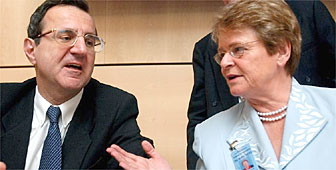
World Health Assembly focuses on bioterror, Aids and patents

Bioterrorism and improving access to drugs for the poor are among the urgent topics to be discussed by health leaders in Geneva this week.
The World Health Assembly – the annual decision-making session of the 191 member states of the Geneva-based World Health Organisation – closes on Friday.
The meeting got under way with the report of the WHO director general, Gro Harlem Brundtland, who said her number one priority remained reducing mortality and disability rates, especially in the poorest and most marginalized populations.
But she said there was room for optimism in the fight against Aids. Taboos were beginning to fall, she said, thanks to increased understanding among the public at large and to greater openness from governments.
Progress
“If you look at the past year compared to the past 20 years, the optimism is well-founded. There’s been tremendous progress,” said WHO spokesman Jon Lidon, who pointed to the creation of the Global Aids Fund, which has meant an increase in funding from industrialised countries, a massive drop in the price of anti-Aids drugs and some high-profile campaigns in the developing world.
“But the fact remains that we are treating thousands when we should be treating millions,” Lidon said. He added that alongside treatment, there should be more emphasis placed on prevention.
Senior WHO officials have identified bioterrorism as a major “evolving subject” following the recent anthrax attacks in the United States, and the assembly is expected to vote on whether to scrap a deadline for destroying smallpox stockpiles.
In January, the WHO overturned a long-standing order for stocks of the smallpox virus – held at high security laboratories in the United States and Russia – to be destroyed by the end of the year. It recommended instead that they be kept for research into new vaccines.
No Pyrrhic victory
There are fears that, despite stringent security and regular monitoring, quantities of the virus have fallen into the hands of rogue states or terrorist groups.
“Our ultimate goal remains to get rid of smallpox once and for all. We just have to be confident that that can happen without any risk,” WHO spokesman Jon Liden said.
“We’re don’t want a Pyrrhic victory. We want to ensure we can meet any future health emergency,” he added.
Smallpox, which once killed or disfigured millions every year, was eradicated in 1979 thanks to a WHO-led campaign.
Liden said several of the world’s richest countries had put in place procedures to deal with possible attacks with biological agents. But not all countries had such resources: “One of the issues we have to look at is, should we adopt a global response to this kind of threat, rather than a national one,” he told swissinfo.
TRIPS
Another important issue is the right of developing countries to relax drug patent rules, so that they can import generic drugs to tackle devastating epidemics like AIDS.
After years of wrangling, there came a sign of encouragement last November, when the World Trade Organisation ministerial meeting in Doha declared that the international agreement on protecting patents “should not prevent members from taking measures to protect public health”.
It was a sign that the richer nations – and by extension the big pharmaceuticals companies – were taking heed of complaints from the developing world and non-governmental organisations that the WTO’s Agreement on Trade-Related Aspects of Intellectual Property Rights (TRIPS) was adversely affecting public health by depriving poorer nations of cheap life-saving drugs.
In her speech, Brundtland praised the fact that many pharmaceuticals companies were now selling their drugs to developing countries at reduced prices.
The WHO says the Doha statement did a great deal to clarify a number of the grey areas surrounding the TRIPS agreement. “But we still have a lot to do with regard to import regimes, the taxation of such medicines, improving distribution and the way these drugs are administered once they reach the local health centres,” Lidon said.
Political issues
Like all major UN gatherings, the WHA will not be spared political points scoring. Taiwan’s perennial bid for observer status is likely to raise Beijing’s hackles, especially as a number of European countries have joined the United States in backing the application.
Meanwhile, a heated debate is guaranteed when the assembly discusses the impact on health of Israel’s reoccupation of parts of the West Bank.
Previous assemblies have blamed Israel for the dire health situation facing Palestinians, and expressed concern that the closure of the territories has harmed sanitation and immunisation programmes.
by Roy Probert

In compliance with the JTI standards
More: SWI swissinfo.ch certified by the Journalism Trust Initiative





























You can find an overview of ongoing debates with our journalists here . Please join us!
If you want to start a conversation about a topic raised in this article or want to report factual errors, email us at english@swissinfo.ch.